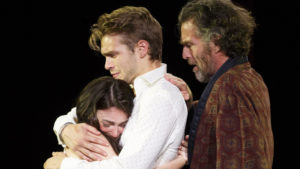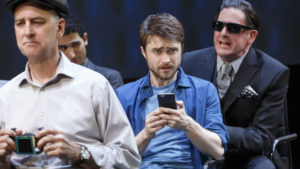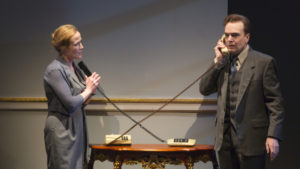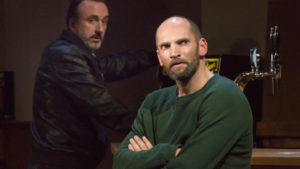 My first Shakespeare in the Park experience was 20 years ago. The night was beautiful, the Delacorte Theater sublime. The play was Timon of Athens. As a poet centuries removed from the Bard sang, two outta three ain’t bad.
My first Shakespeare in the Park experience was 20 years ago. The night was beautiful, the Delacorte Theater sublime. The play was Timon of Athens. As a poet centuries removed from the Bard sang, two outta three ain’t bad.
First-time visitors to the Public’s annual revelries in Central Park are no doubt wrestling with Troilus and Cressida the same way I wrestled with that other outlier in the First Folio. Othello they aren’t. Still, I’m fond of Timon of Athens, which is not the sort of thing Jude Law or Ben Whishaw will bring to Broadway, and pleased that my initial exposure to it was so memorable. (Maybe my only exposure to it, at that.) I was more leery of Troilus and Cressida. Some seasons back I saw an Off Broadway production that ran a full four-and-a-half hours, and it was a strong argument in favor of only seeing carefully abridged versions of any Shakespeare. (No one who sits through Kenneth Branagh’s Hamlet, then sees a typical distillation onstage, ever misses the Gerard Depardieu character or the other hour or so left on the stage floor.) The good news is that this Troilus and Cressida has been nipped and tucked and dealt with, with a third act as thrilling as any Hollywood blockbuster–say, for example, Troy.
I say that for a reason, as this is a telling (never performed in Shakespeare’s time, which tells you something) of the Trojan War. Troilus (Andrew Burnap) is the son of Priam, King of Troy. He’s in love with Cressida (Ismenia Mendes), whose father, Calchas, has defected to the Greeks and left her in the care of her uncle, Pandarus (the great John Glover, reason enough to brave the C train for tonight’s final performance). Cressida is used as a bargaining chip in the long and exhausting war, and newcomers will assume, given the title, that a Romeo and Juliet rom-tragedy is at hand. Not quite–the show leaves them for long stretches, and more or less wraps up their star-crossed relationship before the concluding pyrotechnics. The show has no center, instead observing characters in each rival camp, who have little that’s pithy or quotable or “Shakespearean” to say. They’re survivors, and they’ve reached their breaking point.
 This is a crowded, unwieldy play even at a more manageable three hours, made a bit easier to follow on a garbage-strewn stage by the presence of New York stage veterans like Glover, who “panders” quite winningly. Troilus’ brother, the famed warrior Hector, is inposingly portrayed by Bill Heck (pictured, above, with Burnap), who I first saw in gentler mode in Horton Foote’s The Orphans’ Home Cycle. His rival, Achilles, was played by David Harbour, but after an onstage injury was replaced by a wild and boastful Louis Cancelmi. Agamemnon, the Greeks’ leader, is the commanding John Douglas Thompson. Ulysses is the sharp-dressed and clever Corey Stoll, Woody Allen favorite and Ant-Man nemesis. I’d follow these actors into battle anywhere.
This is a crowded, unwieldy play even at a more manageable three hours, made a bit easier to follow on a garbage-strewn stage by the presence of New York stage veterans like Glover, who “panders” quite winningly. Troilus’ brother, the famed warrior Hector, is inposingly portrayed by Bill Heck (pictured, above, with Burnap), who I first saw in gentler mode in Horton Foote’s The Orphans’ Home Cycle. His rival, Achilles, was played by David Harbour, but after an onstage injury was replaced by a wild and boastful Louis Cancelmi. Agamemnon, the Greeks’ leader, is the commanding John Douglas Thompson. Ulysses is the sharp-dressed and clever Corey Stoll, Woody Allen favorite and Ant-Man nemesis. I’d follow these actors into battle anywhere.
If the boggy theatrics and humid weather have you considering an exit after the first act, man up and stay for the second, for the final battle. Director Daniel Sullivan and co-fight directors Michael Rossmy and Rick Sordelet have staged a climactic clash that’s among the greatest spectacles I’ve ever seen onstage, with hand-to-hand combat, bloody executions, explosions, and gunfire that must set passers-by scattering into the woods. It’s a wonder any of the performers made it through intact. The modern-day trappings are intended to remind us of our own grinding wars in far-off places. They do. But they also confirm that no city has better stagecraft than New York, and they make the problem play Troilus and Cressida less of a problem for viewers.
 The war on privacy is being tackled downtown at the Public. James Graham’s Privacy, which also closes today, is more of a pillow fight, a fluffy entertainment hosted by Harry Potter–I mean, Daniel Radcliffe, who has found a second career on the New York stage. Co-created by Graham and Josie Rourke, and directed by Rourke, this is an Americanized version of a London hit. Radcliffe is The Writer, who has fled a broken relationship with his boyfriend to start over again in New York. Trouble is, his digital footprint has followed, and complicates his search for more of an identity. With everything available at the touch of his iPhone, he’s lost his sense of self, a dissolution marketers are more than happy to help him with. The supporting cast pops up in various guises, sometimes as real experts in the shifting field of privacy law, who drop a few tidbits about protecting our own records. At play’s, and wit’s, end, no less an authority than Edward Snowden appears, a ghost on the projection screen, to recite from The Tempest and point the way ahead for our confused protagonist.
The war on privacy is being tackled downtown at the Public. James Graham’s Privacy, which also closes today, is more of a pillow fight, a fluffy entertainment hosted by Harry Potter–I mean, Daniel Radcliffe, who has found a second career on the New York stage. Co-created by Graham and Josie Rourke, and directed by Rourke, this is an Americanized version of a London hit. Radcliffe is The Writer, who has fled a broken relationship with his boyfriend to start over again in New York. Trouble is, his digital footprint has followed, and complicates his search for more of an identity. With everything available at the touch of his iPhone, he’s lost his sense of self, a dissolution marketers are more than happy to help him with. The supporting cast pops up in various guises, sometimes as real experts in the shifting field of privacy law, who drop a few tidbits about protecting our own records. At play’s, and wit’s, end, no less an authority than Edward Snowden appears, a ghost on the projection screen, to recite from The Tempest and point the way ahead for our confused protagonist.
I probably should have redacted that bit about Snowden, as the Public has been eager to protect the privacy of Privacy. It’s pretty much done now, however, and I don’t mind spilling a few secrets. For one thing, you’re encouraged to keep your smartphone on for the entire show, as the show pulls you into the void with text messages and inducements to take selfies. I didn’t mind playing along, but I wish I had spilled my metadata on a more rigorous show. With the chipper Radcliffe as our host, Privacy is a little too ingratiating and user-friendly for a topic that grows more complicated and troubling with each passing app.
 If Oslo were a movie, it would open in a few prestigious theaters in mid-December, and “roll out” nationwide in tandem with Oscar nominations. Not having enough juice or passion to sway voters, it wouldn’t win anything.
If Oslo were a movie, it would open in a few prestigious theaters in mid-December, and “roll out” nationwide in tandem with Oscar nominations. Not having enough juice or passion to sway voters, it wouldn’t win anything.
A happier end may be in store for Oslo, the play. Still, like those Oscar-nominated movies that can’t quite crack the winner’s circle, I can’t imagine wanting to revisit it. The author, J.T. Rogers, writes about big subjects of recent import–Rwanda (The Overwhelming), Afghanistan (Blood and Gifts). Here his subject is the Oslo Peace Accords, signed in 1993 by the Israelis and Palestinians after long and rancorous secret negotiations in Norway. As in Privacy, the leads, Tony winners Jefferson Mayes and Jennifer Ehle, essentially host the show, as the married tacticians who must summon every ounce of diplomacy they can muster to keep the talks going. Ehle dispenses exposition, Mayes keeps a stiff upper lip, Norwegian-style, and both are wasted as lesser actors hew to stereotype as the squabbling parties. Rogers pens a few clever-ish one-liners for the performers to lob at us to hold our interest. It didn’t hold mine–I’ve seen this movie before, a weighty historical subject filled with hard truths that are softened by banter and uplift, and the three acts dragged on as much as the Oslo sessions must have for the participants. Part of it was the design, or the lack thereof–there’s minimal, and there’s a table, chairs, dim lighting, and some projections, as seen, or hard to see, here. The director, Bartlett Sher, and his creative team have done far better at Lincoln Center, with more opulent material to be sure (South Pacific, The King and I). Yet their contributions don’t help the show shake its FAQ quality, which it shares with Rogers’ other well-intentioned, yet tedious, work.
After its successful run at the Mitzi Newhouse ends, Oslo will reopen on Broadway in the spring, for Tony consideration. Of course it will.
 “A man walks into a bar…”–there’s a joke like that in Oslo. In the Irish Repertory Theatre production of the Abbey Theatre’s Quietly, by Owen McCafferty, it’s no joke. A man walks into a bar, a punch is immediately thrown, and the next 75 minutes explain to us why.
“A man walks into a bar…”–there’s a joke like that in Oslo. In the Irish Repertory Theatre production of the Abbey Theatre’s Quietly, by Owen McCafferty, it’s no joke. A man walks into a bar, a punch is immediately thrown, and the next 75 minutes explain to us why.
Part of my problem with Oslo is the central couple, who act as a kind of framing device for the production. They’re not entirely necessary. Quietly concentrates on two men who carry a shared awful history in their bones. As a soccer match between Poland and Northern Ireland plays on a pub TV in Belfast, a greater conflict erupts. Jimmy (Patrick O’Kane) has been waiting for Ian (Declan Conlon) to turn up, and when he does, it doesn’t go well. Decades earlier, Ian and his confederates bombed the same pub, killing six men who were thought to be IRA sympathizers. One of them was Jimmy’s father.
What ensues is a ferocious back and forth, pungently written, tautly directed (by Jimmy Fay), and delivered with a muscular clarity by the two performers. (Robert Zawadzki plays the bartender, a Polish immigrant who observes the conversation, and interjects some humor.) Time has not healed old wounds, and the terrors of the past are only a heartbeat away for both men. Yet the hearts still beat. Can there be a reckoning, or reconciliation? Or is bitterness the only path as the Troubles recede? Quietly, a gem of a play, asks important questions, and doesn’t duck from confronting its audience.





Comments